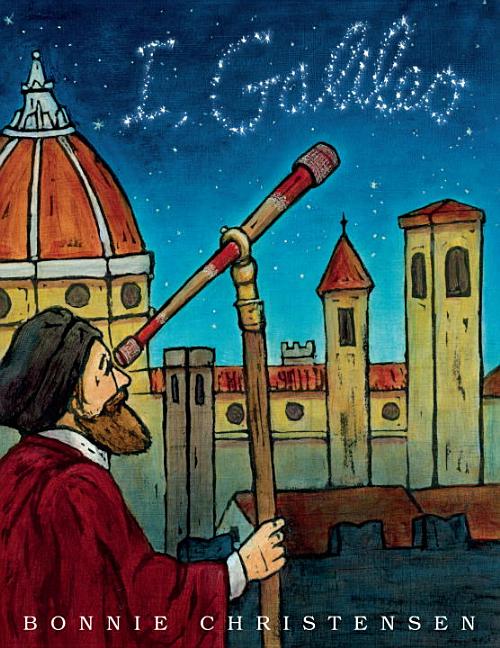Book Descriptions
for I, Galileo by Bonnie Christensen
From Cooperative Children's Book Center (CCBC)
Condemned by the Church to solitude and by nature to darkness (he’d gone blind), Galileo reflects on a life filled with extraordinary vision and the discovery of truth in Bonnie Christensen’s artful picture book biography that imagines the scientist and astronomer’s first-person voice. “I was the first child, center of my parents’ universe. Life revolved around me.” Galileo describes his childhood education, his teaching, and above all his dedication to learning and discovery. Motion fascinated him. So, too, did the moon, the sun, and the planets. He was a meticulous observer and recorder, using the telescope he’d perfected to determine the earth revolves around the sun. After seven years of silence he finally published his observations. Heresy! said the Church. He was sentenced to live out his days a prisoner in his own home. End matter includes a brief summary of some of Galileo’s key experiments, inventions, and discoveries, as well as a chronology and source material for this narrative set against Christensen’s warm, eye-catching oil and gouache paintings. (Ages 6–10)
CCBC Choices 2013. © Cooperative Children's Book Center, Univ. of Wisconsin - Madison, 2013. Used with permission.
From the Publisher
Acclaimed author-illustrator Bonnie Christensen adopts the voice of Galileo and lets him tell his own tale in this outstanding picture book biography. The first person narration gives this book a friendly, personal feel that makes Galileo's remarkable achievements and ideas completely accessible to young readers. And Christensen's artwork glows with the light of the stars he studied.
Galileo's contributions were so numerous—the telescope! the microscope!—and his ideas so world-changing—the sun-centric solar system!—that Albert Einstein called him "the father of modern science." But in his own time he was branded a heretic and imprisoned in his home. He was a man who insisted on his right to pursue the truth, no matter what the cost—making his life as interesting and instructive as his ideas.
Galileo's contributions were so numerous—the telescope! the microscope!—and his ideas so world-changing—the sun-centric solar system!—that Albert Einstein called him "the father of modern science." But in his own time he was branded a heretic and imprisoned in his home. He was a man who insisted on his right to pursue the truth, no matter what the cost—making his life as interesting and instructive as his ideas.
Publisher description retrieved from Google Books.


